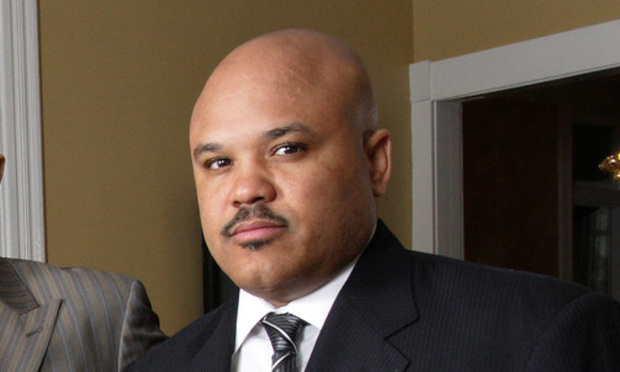Judge Strikes Defenses for Landlord Where Gang Member Murdered Teenage Girl
DeKalb State Court Judge Johnny Panos concludes key company officials repeatedly lied about their knowledge of gang activity at the Highlands at East Atlanta apartments, where a gang member gunned down a 17-year-old girl.
October 05, 2018 at 03:46 PM
6 minute read
 Thomas “Woody” Sampson Jr. (Photo: Alison Church/ALM)
Thomas “Woody” Sampson Jr. (Photo: Alison Church/ALM)
A DeKalb County judge struck the defenses of an East Atlanta apartment complex where a teenage girl was murdered, ruling corporate officials repeatedly lied when they claimed they were unaware of gang activity at the crime-plagued development.
DeKalb County State Court Judge Johnny Panos said the owners of the Highlands at East Atlanta Apartments displayed a “pattern of deliberate misconduct [that] justifies the striking of their liability defenses” in the case.
The ruling means the issues remaining in the case against Highlands and management company NuRock Management Group are the value of the life of 17-year-old Sariah Wilcoxson, possible treble damages for violating Georgia's anti-gang law and whether punitive damages are appropriate.
As detailed in the Sept. 28 order and other filings, Wilcoxson, who lived at the apartments, was standing near a bus stop in front of the complex when another Highlands resident, Deandre Seabrooks, got out of a car on Flat Shoals Road and opened fire with an AK-47 rifle.
Wilcoxson, who had just gotten her GED and was about to enter military school, was left to die just inside the complex's property line.
Seabrooks, who had a lengthy criminal record and was a known member of the Bloods street gang, was arrested 10 days later and is serving a life sentence without parole at Smith State Prison in Tattnall County.
The Highlands was a rough place: The month before Wilcoxson was murdered, a 4-year-old boy was shot while riding his Big Wheel at the complex, and the DeKalb police precinct commander for the area assigned a special anti-gang task force to the Highlands in 2015.
A maintenance man testified he routinely had to scrub gang signs off the buildings, and a former property manager said she had seen “groups of young men standing about in the breezeways carrying AK-47s and AR-15s,” Panos' order said.
In December 2015, police K.D. Johnson told NuRock, “Their security was not getting the job done and that they needed approximately 10 armed, off-duty police officers providing security full time at the complex men,” the order said.
Even so, NuRock's asset manager testified there were no regular security patrols at the complex until after Wilcoxson's murder.
Wilcoxson's mother, Sarita Wilcoxson, sued Highlands, NuRock and their then-security contractors Counter Measures Operations Inc., or CMO.
The complaint, filed by Thomas Kennedy Sampson & Tompkins lawyers Thomas “Woody” Sampson and Shermela Williams, Moore Law Firm principal S. Leighton Moore III and Demetra Ford of Ford Law, included counts of wrongful death, premises liability, public nuisance and vicarious liability.
 Sidney Leighton Moore III (Photo: Rebecca Breyer/ALM)
Sidney Leighton Moore III (Photo: Rebecca Breyer/ALM)Sampson and Moore said CMO never responded to the complaint and was declared in default.
“That was one reason why [NuRock's] answer was struck,” Sampson said. “We served discovery asking about CMO and their security schedules and the names of their guard.
“NuRock claimed they had no information. We found out later that they were still working at the complex where the incident occurred and NuRock was in daily communication with them. Six months after they answered our discovery, they fired CMO.”
That was just one reason for Panos' decision, which also cited the testimony of four NuRock representatives as justification for striking its answer.
“All of defendants' highest-ranking managerial employees testified in their depositions that they knew nothing of any gang activity at the Highlands,” Panos wrote.
But emails turned over in response to a discovery order earlier this year for NuRock executives Robert Hoskins, Sandy Hoskins, regional manager Debbie Davis and asset manager Rebecca Lively proved otherwise, he said.
For example, he said a 2015 email from Davis said she called police to break up a “gang party” of 20 to 30 young men, which led to drug and weapons arrests.
All four NuRock officials were on an email chain discussing a YouTube video of a gang the precinct commander had told them about involving a tenant's complaint about a “gang shootout” and a pending visit by a county commissioner to discuss the issue.
“All four of these witnesses flatly denied” any knowledge of gangs at the apartments, “and several of them unequivocally denied that they ever heard any reports of gang activity at the Highlands,” Panos said.
“Yet these witnesses' emails, which were not produced until well over a year into the litigation, make it clear beyond question that all four of them received notice of gang activity,” he said.
Panos wrote the “false testimony strikes at the heart of the court's truth-finding function and undermine the reliability of the trial, warranting the severest sanction available to the court.”
The defense also moved for summary judgment, arguing Georgia's Street Gang Terrorism and Prevention Act, whose provisions allow for treble damages for properties deemed a public nuisance if they knowingly harbor gang activity, should not apply to the Highlands.
“Defendants argues that there is not evidence that Sariah Wilcoxson was 'injured by reason of criminal gang activity' so as to have a cause of action for treble damages,” Panos said. “The court disagrees.”
Under the terms of the gang law, “a reasonable jury could conclude that a gang satisfying the statutory definition of a 'criminal street gang' used the Highlands property for gang activity over a long period of time and that Sariah's death was the result of gang activity,” he wrote.
The defendants are represented by John McKinley and Deborah Cameron of Mozley, Finlayson & Loggins; on Sept. 13, they were joined by a team of Weinberg Wheeler Hudgins Gunn & Dial lawyers including Mark Johnson, Jackson “Jad” Dial and Clare Zhang.
They declined to comment.
The defense requested a certificate of immediate review, which Panos granted Thursday.
This content has been archived. It is available through our partners, LexisNexis® and Bloomberg Law.
To view this content, please continue to their sites.
Not a Lexis Subscriber?
Subscribe Now
Not a Bloomberg Law Subscriber?
Subscribe Now
NOT FOR REPRINT
© 2025 ALM Global, LLC, All Rights Reserved. Request academic re-use from www.copyright.com. All other uses, submit a request to [email protected]. For more information visit Asset & Logo Licensing.
You Might Like
View All
Why Georgia's Latest Push to Curb Lawsuits Has Business Groups and Trial Lawyers at Odds
6 minute read
Eversheds Sutherland Moving After 36 Years to Smaller Atlanta Office
4 minute read
Fowler White Burnett Opens Jacksonville Office Focused on Transportation Practice
3 minute read
Trending Stories
- 1New York-Based Skadden Team Joins White & Case Group in Mexico City for Citigroup Demerger
- 2No Two Wildfires Alike: Lawyers Take Different Legal Strategies in California
- 3Poop-Themed Dog Toy OK as Parody, but Still Tarnished Jack Daniel’s Brand, Court Says
- 4Meet the New President of NY's Association of Trial Court Jurists
- 5Lawyers' Phones Are Ringing: What Should Employers Do If ICE Raids Their Business?
Who Got The Work
J. Brugh Lower of Gibbons has entered an appearance for industrial equipment supplier Devco Corporation in a pending trademark infringement lawsuit. The suit, accusing the defendant of selling knock-off Graco products, was filed Dec. 18 in New Jersey District Court by Rivkin Radler on behalf of Graco Inc. and Graco Minnesota. The case, assigned to U.S. District Judge Zahid N. Quraishi, is 3:24-cv-11294, Graco Inc. et al v. Devco Corporation.
Who Got The Work
Rebecca Maller-Stein and Kent A. Yalowitz of Arnold & Porter Kaye Scholer have entered their appearances for Hanaco Venture Capital and its executives, Lior Prosor and David Frankel, in a pending securities lawsuit. The action, filed on Dec. 24 in New York Southern District Court by Zell, Aron & Co. on behalf of Goldeneye Advisors, accuses the defendants of negligently and fraudulently managing the plaintiff's $1 million investment. The case, assigned to U.S. District Judge Vernon S. Broderick, is 1:24-cv-09918, Goldeneye Advisors, LLC v. Hanaco Venture Capital, Ltd. et al.
Who Got The Work
Attorneys from A&O Shearman has stepped in as defense counsel for Toronto-Dominion Bank and other defendants in a pending securities class action. The suit, filed Dec. 11 in New York Southern District Court by Bleichmar Fonti & Auld, accuses the defendants of concealing the bank's 'pervasive' deficiencies in regards to its compliance with the Bank Secrecy Act and the quality of its anti-money laundering controls. The case, assigned to U.S. District Judge Arun Subramanian, is 1:24-cv-09445, Gonzalez v. The Toronto-Dominion Bank et al.
Who Got The Work
Crown Castle International, a Pennsylvania company providing shared communications infrastructure, has turned to Luke D. Wolf of Gordon Rees Scully Mansukhani to fend off a pending breach-of-contract lawsuit. The court action, filed Nov. 25 in Michigan Eastern District Court by Hooper Hathaway PC on behalf of The Town Residences LLC, accuses Crown Castle of failing to transfer approximately $30,000 in utility payments from T-Mobile in breach of a roof-top lease and assignment agreement. The case, assigned to U.S. District Judge Susan K. Declercq, is 2:24-cv-13131, The Town Residences LLC v. T-Mobile US, Inc. et al.
Who Got The Work
Wilfred P. Coronato and Daniel M. Schwartz of McCarter & English have stepped in as defense counsel to Electrolux Home Products Inc. in a pending product liability lawsuit. The court action, filed Nov. 26 in New York Eastern District Court by Poulos Lopiccolo PC and Nagel Rice LLP on behalf of David Stern, alleges that the defendant's refrigerators’ drawers and shelving repeatedly break and fall apart within months after purchase. The case, assigned to U.S. District Judge Joan M. Azrack, is 2:24-cv-08204, Stern v. Electrolux Home Products, Inc.
Featured Firms
Law Offices of Gary Martin Hays & Associates, P.C.
(470) 294-1674
Law Offices of Mark E. Salomone
(857) 444-6468
Smith & Hassler
(713) 739-1250






